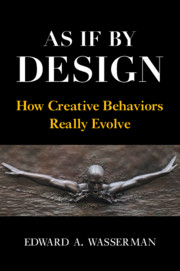Book contents
- As If By Design
- As If By Design
- Copyright page
- Dedication
- Contents
- Figures
- Acknowledgments
- Section 1 Introduction
- Section 2 The Vignettes
- Part I Sports
- Part II Medicine
- Part III Hygiene
- Part IV Arts, Entertainment, and Culture
- 16 Ansel Adams
- 17 Basil Twist: “Genius” Puppeteer
- 18 Moonwalking: And More Mundane Modes of Moving
- 19 Play on Words
- 20 Cuatro Festivales Españoles
- 21 Tchaikovsky
- 22 The Evolution of the Violin
- Part V Is This Heaven? No, It’s Iowa!
- Section 3 Putting It Together
- Index
- References
18 - Moonwalking: And More Mundane Modes of Moving
from Part IV - Arts, Entertainment, and Culture
Published online by Cambridge University Press: 01 July 2021
- As If By Design
- As If By Design
- Copyright page
- Dedication
- Contents
- Figures
- Acknowledgments
- Section 1 Introduction
- Section 2 The Vignettes
- Part I Sports
- Part II Medicine
- Part III Hygiene
- Part IV Arts, Entertainment, and Culture
- 16 Ansel Adams
- 17 Basil Twist: “Genius” Puppeteer
- 18 Moonwalking: And More Mundane Modes of Moving
- 19 Play on Words
- 20 Cuatro Festivales Españoles
- 21 Tchaikovsky
- 22 The Evolution of the Violin
- Part V Is This Heaven? No, It’s Iowa!
- Section 3 Putting It Together
- Index
- References
Summary
As a theatrical art form, puppetry has existed for as long as 4,000 years and has been traced to Europe, Asia, and Africa. Even now, puppetry continues to evolve – from representational to abstract and from traditional to avant-garde. One of today’s leading puppeteers is Basil Twist, who excels in both traditional and avant-garde performance. Twist vaulted to fame in 1998 largely because of his breakthrough performance of Symphonie Fantastique. That work propelled his receipt of a 2015 MacArthur Foundation Fellowship – the so-called genius award. Twist’s Symphonie Fantastique is an amazing assemblage of water, feathers, fabric, classical music, and dramatic lighting. How did the piece come to be? Was it the result of meticulous and foresighted planning? Or was its origin more improvisational and experimental? The answers shed fresh light on the meaning of creative genius and on the nature of puppet art.
Keywords
- Type
- Chapter
- Information
- As If By DesignHow Creative Behaviors Really Evolve, pp. 199 - 211Publisher: Cambridge University PressPrint publication year: 2021

